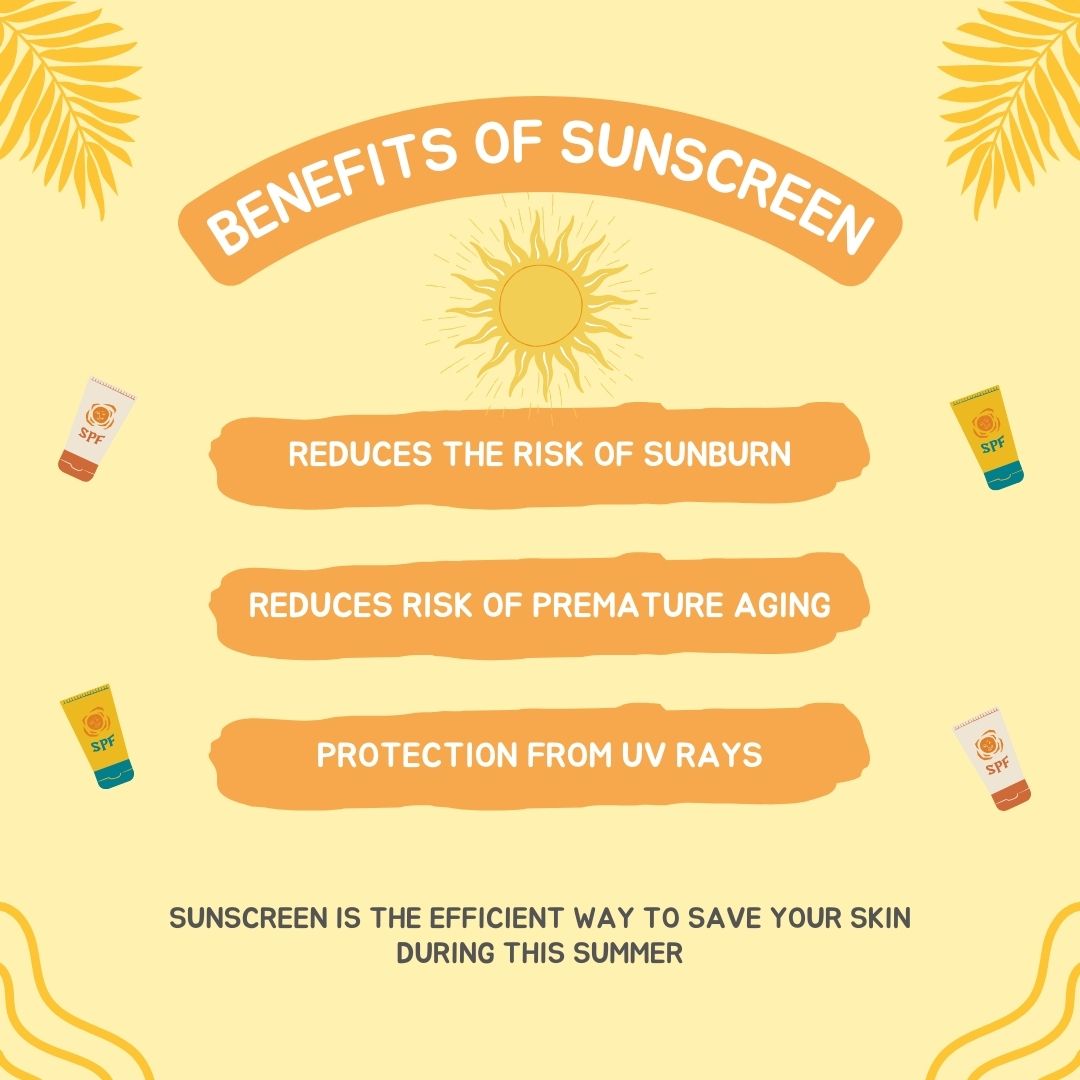The majority of us travel to work and also attend college, and we return home with an untidy appearance in the evening. Have you ever noticed how your skin varies from morning to evening?
The sun’s UV rays shine directly on your face and skin, making it tan and causing premature aging. This makes you appear inactive.
To avoid this problem and keep your skin healthy and active throughout the day, you should follow a skincare routine that includes sunscreen.
Introduction
Sunscreen is a product that protects the skin from harmful UVA and UVB rays. Sunscreen products come in various forms, such as lotions, creams, gels, and ointments. The major factors to consider when picking up sunscreen are broad-spectrum protection and the SPF rating.
What are ultraviolet rays? What are the UVA and UVB rays?
The sun emits ultraviolet radiation. UV radiation has shorter wavelengths than visible light, so it is invisible to the eye.
UVA rays cause skin to wrinkle, tan, and burn. Excessive exposure causes skin cancer.
UVB rays cause damage to your skin’s outer layer. It can cause sun spots, tanning, sunburns, and blistering, which can eventually lead to skin cancer.
What is Broad Spectrum Protection?
Broad-spectrum sunscreen acts as a shield that protects your skin from UVA and UVB rays.
UVB rays are the most powerful, causing sunburn and skin cancer, while UVA rays cause premature ageing. Choosing broad-spectrum protection sunscreen shields you from both rays.
What is SPF rating?
SPF stands for sun protection factor. It measures how well the sunscreen protects your skin from UV rays. The higher the SPF rating, the better the skin’s protection against UV radiation.
Various SPF ratings and their benefits
| SPF 30 | SPF 50 |
|---|---|
| It blocks around 96.7% of UVB rays. | It blocks around 98% of UVB rays. |
| It allows about 1/30th of the sun’s rays to reach our skin. | It allows only 1/50th of the sun’s rays to reach our skin. |
| It gives good protection for everyday activities and moderate exposure to the sun. | It is recommended for people who spend prolonged hours of outdoor activities. Also suitable for people with sensitive skin. |
| It is for daily use. | It can be used during vacation, on the beach, hiking, outdoor sports, etc. |
How does sunscreen work?
Sunscreen acts as a protective layer between your skin and UV rays. When UV rays hit your skin, they are reflected by the protective layer. The effectiveness of sunscreen is determined by its ingredients, but they can be broadly divided into two types.
Physical filters and chemical filters.
Physical filters: These mineral sunscreens contain active mineral ingredients like zinc oxide and titanium oxide. The physical filters do their work by sitting on the top layer of skin and physically blocking or reflecting UV rays away from the skin.
Chemical filters: These are designed to absorb specific types of UV radiation, such as UVA and UVB rays. Chemical filters include avobenzone and oxybenzone.
Ingredients to consider in sunscreen
Physical Ingredients:
Zinc oxide is the most popular physical filter, offering broad-spectrum protection against both UVA and UVB radiation. It is suitable for sensitive skin.
Titanium dioxide is another physical broad-spectrum filter that is very effective at scattering back UV rays. It shows less effect on UVA rays compared to zinc oxide. It might leave a slight white shade if you have dark skin.
Chemical Ingredients:
Oxybenzone, avobenzone, and octinoxate are some of the chemical ingredients.
Bonus Tip
Try to avoid chemical ingredients because the problem with these ingredients is that they may cause irritation or allergic infections.
Benefits of using sunscreen
Prevents Sunburn: Sunscreen with a higher SPF rating acts as a protective layer for your skin against UVB rays. It prevents burning and relieves discomfort, resulting in better skincare.
Reduces the Risk of Skin Cancer: Long hours of exposure to UV radiation can lead to skin cancer. Using a sunscreen with broad-spectrum protection will help you fight skin cancer.
Delays Premature ageing: Exposing your skin to UV radiation for long hours causes tan and wrinkles. Sunscreen helps to protect the skin and makes you look younger.
Brightening skin tone: It not only protects your skin from UV rays but also helps your skin stay hydrated and look brighter, making skin tone even.
How to use sunscreen
1. Wash your face and apply any of the moisturizers for hydration. Take some amount of sunscreen on hand.
2. Apply it to all parts that are exposed to the sun, such as the face, neck, hands, fingers, and toes.
3. Make sure you apply it 30 minutes before moving out.
4. If you sweat frequently during peak hours (10 a.m. to 4 p.m.), apply it every 2 hours.
Conclusion
In today’s world, where climate change is a challenge, the UV rays reaching the earth are so powerful that they can harm a person if they do not follow the advice, and one thing we need to protect is our skin from all the harmful rays.
Therefore, daily skin care becomes essential, and sunscreen can help protect your skin. With the right sunscreen, you will always get great results. Using a broad-spectrum sunscreen with a high SPF may help. Prevents premature ageing, skin cancer, and moles. Using the right sunscreen can help keep your skin hydrated and brighten it.
Proper skin care today will lead to better skin tomorrow.
Get started today.




That’s a nice explanation on sunscreen I ever read…tq
👍🏻
It has brief explanation about, what is a skin care routine and needs of sunscreen to the new users….. overall it is has a clear point.